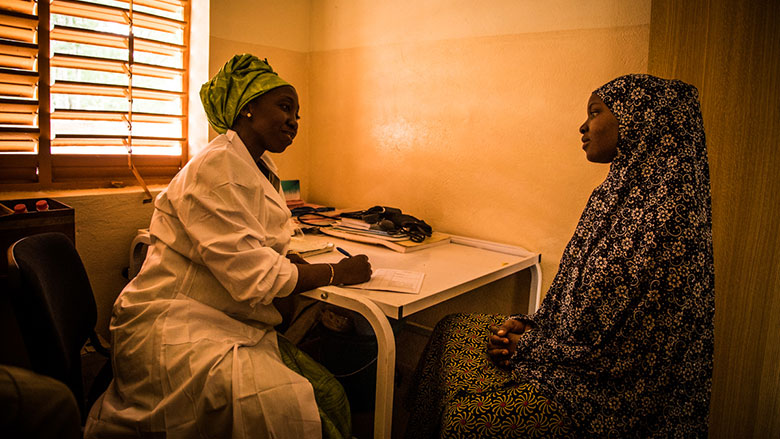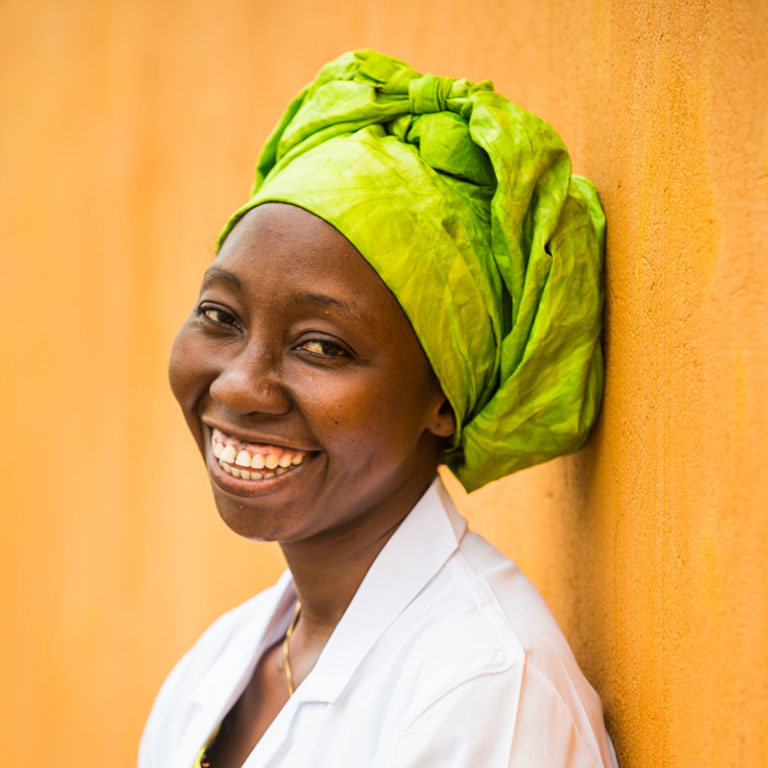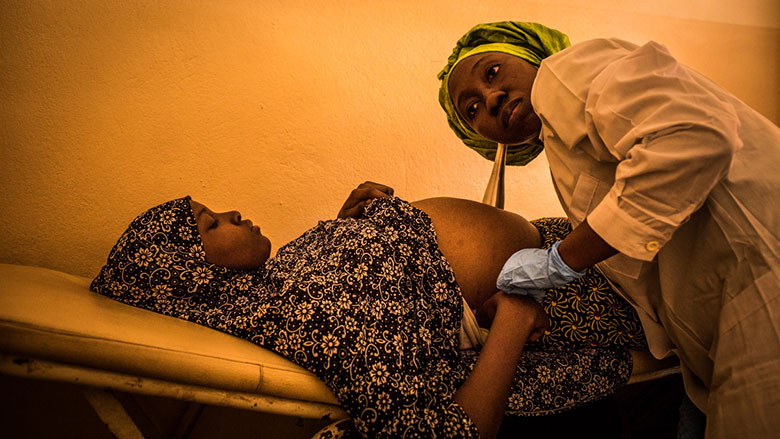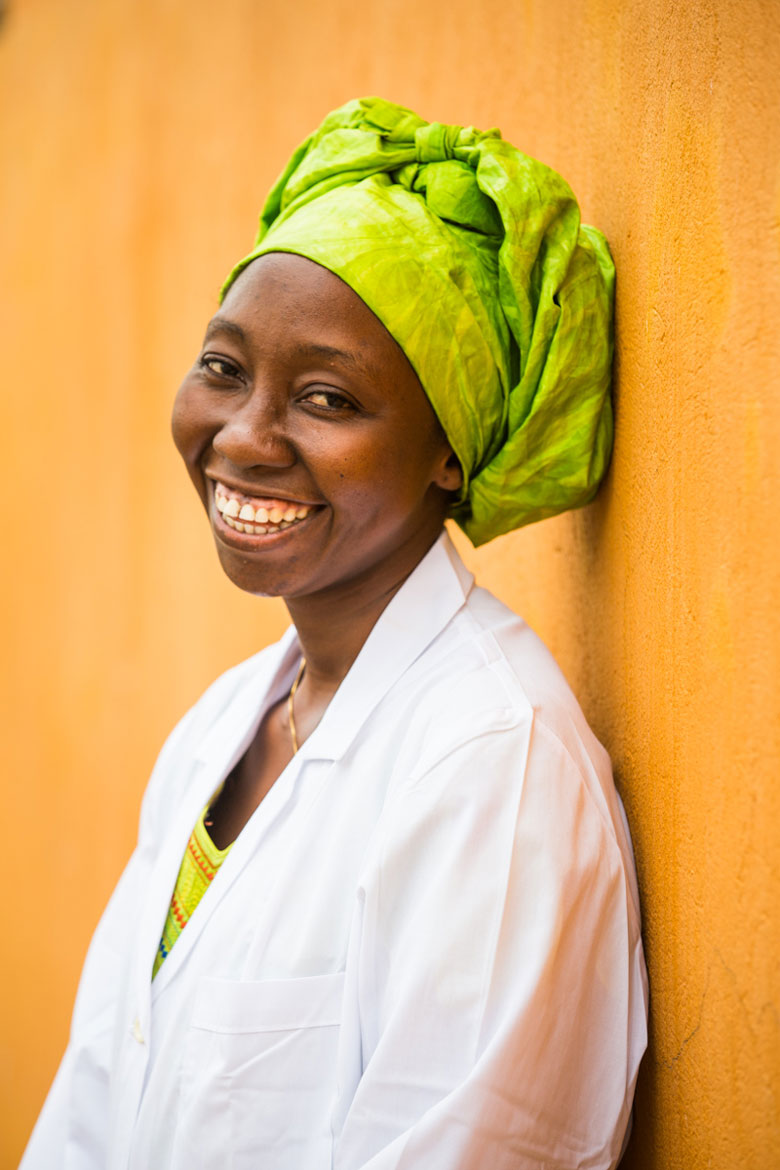Dr. Mabetty Camara consulting Oumou in Koba. Photo: Vincent Tremeau, World Bank
“Women now have the privacy they seek and can freely come for deliveries and prenatal visits,” says Dr. Camara, who has also been able to initiate a program to supply kits that include a bucket, soap, mosquito nets, and clothes for newborns to distribute to women during their visits to clinics to encourage pregnancy monitoring. “We are very thankful for this new center that will allow us to deliver our babies safely” says Oumou Ly, who is pregnant with her second child.
While the Ebola Response Project, supported by a $105 million IDA grant, has helped strengthen basic health services in Guinea, Liberia, and Sierra Leone, the Primary Health Services Improvement Project has more specifically focused on improving maternal, child health, and nutrition services in Guinea’s rural health centers. With $15 million from IDA, the project has strengthened both the supply and demand in target areas by increasing the number and performance of health workers and the availability of equipment and supplies. It has also reinforced the capacity of community health workers and community health insurance schemes to generate community-level demand.
From 2016 to 2018, the number of births attended by skilled health personnel increased from about 27,000 to 44,000 and the percentage of children aged between 0 to 11 months fully vaccinated rose from 57 to 66 percent. Over half of pregnant women (55 percent) received at least four antenatal care visits from health provider compared to 47 percent before. To date, there are over 336,000 direct beneficiaries, mostly women (75 percent).
"The Ebola outbreak weakened the Guinean health system and the capacity to treat basic diseases remains limited. By strengthening basic health care delivery and investing in results-based interventions geared to local needs, the World Bank will continue to improve reproductive, maternal, newborn and child health care. Through our intervention in Guinea, we aim to help Oumou and other women like her deliver their babies in safe conditions." added Ibrahim Magazi, Senior Health Specialist.
Work continues to rebuild trust in and capacity of Guinea’s primary healthcare system. The World Bank has recently approved $ 55 million project to improve the health of mothers and children in two of Guinea's poorest regions, Kindia and Kankan. The Strengthening the Health system and Capacity project in Guinea aims to help the government better plan and sustainably fund public health policy in the country.
Dr. Mabetty Camara consulting Oumou in Koba. Photo: Vincent Tremeau, World Bank “Women now have the privacy they seek and can freely come for deliveries and prenatal visits,” says Dr. Camara, who has also been able to initiate a program to supply kits that include a bucket, soap, mosquito nets, and clothes for newborns to distribute to women during their visits to clinics to encourage pregnancy monitoring. “We are very thankful for this new center that will allow us to deliver our babies safely” says Oumou Ly, who is pregnant with her second child.
While the Ebola Response Project, supported by a $105 million IDA grant, has helped strengthen basic health services in Guinea, Liberia, and Sierra Leone, the Primary Health Services Improvement Project has more specifically focused on improving maternal, child health, and nutrition services in Guinea’s rural health centers. With $15 million from IDA, the project has strengthened both the supply and demand in target areas by increasing the number and performance of health workers and the availability of equipment and supplies. It has also reinforced the capacity of community health workers and community health insurance schemes to generate community-level demand.
From 2016 to 2018, the number of births attended by skilled health personnel increased from about 27,000 to 44,000 and the percentage of children aged between 0 to 11 months fully vaccinated rose from 57 to 66 percent. Over half of pregnant women (55 percent) received at least four antenatal care visits from health provider compared to 47 percent before. To date, there are over 336,000 direct beneficiaries, mostly women (75 percent).
"The Ebola outbreak weakened the Guinean health system and the capacity to treat basic diseases remains limited. By strengthening basic health care delivery and investing in results-based interventions geared to local needs, the World Bank will continue to improve reproductive, maternal, newborn and child health care. Through our intervention in Guinea, we aim to help Oumou and other women like her deliver their babies in safe conditions." added Ibrahim Magazi, Senior Health Specialist.
Work continues to rebuild trust in and capacity of Guinea’s primary healthcare system. The World Bank has recently approved $ 55 million project to improve the health of mothers and children in two of Guinea's poorest regions, Kindia and Kankan. The Strengthening the Health system and Capacity project in Guinea aims to help the government better plan and sustainably fund public health policy in the country.
Dr. Mabetty Camara consulting Oumou in Koba. Photo: Vincent Tremeau, World Bank “Women now have the privacy they seek and can freely come for deliveries and prenatal visits,” says Dr. Camara, who has also been able to initiate a program to supply kits that include a bucket, soap, mosquito nets, and clothes for newborns to distribute to women during their visits to clinics to encourage pregnancy monitoring. “We are very thankful for this new center that will allow us to deliver our babies safely” says Oumou Ly, who is pregnant with her second child.
While the Ebola Response Project, supported by a $105 million IDA grant, has helped strengthen basic health services in Guinea, Liberia, and Sierra Leone, the Primary Health Services Improvement Project has more specifically focused on improving maternal, child health, and nutrition services in Guinea’s rural health centers. With $15 million from IDA, the project has strengthened both the supply and demand in target areas by increasing the number and performance of health workers and the availability of equipment and supplies. It has also reinforced the capacity of community health workers and community health insurance schemes to generate community-level demand.
From 2016 to 2018, the number of births attended by skilled health personnel increased from about 27,000 to 44,000 and the percentage of children aged between 0 to 11 months fully vaccinated rose from 57 to 66 percent. Over half of pregnant women (55 percent) received at least four antenatal care visits from health provider compared to 47 percent before. To date, there are over 336,000 direct beneficiaries, mostly women (75 percent).
"The Ebola outbreak weakened the Guinean health system and the capacity to treat basic diseases remains limited. By strengthening basic health care delivery and investing in results-based interventions geared to local needs, the World Bank will continue to improve reproductive, maternal, newborn and child health care. Through our intervention in Guinea, we aim to help Oumou and other women like her deliver their babies in safe conditions." added Ibrahim Magazi, Senior Health Specialist.
Work continues to rebuild trust in and capacity of Guinea’s primary healthcare system. The World Bank has recently approved $ 55 million project to improve the health of mothers and children in two of Guinea's poorest regions, Kindia and Kankan. The Strengthening the Health system and Capacity project in Guinea aims to help the government better plan and sustainably fund public health policy in the country.




